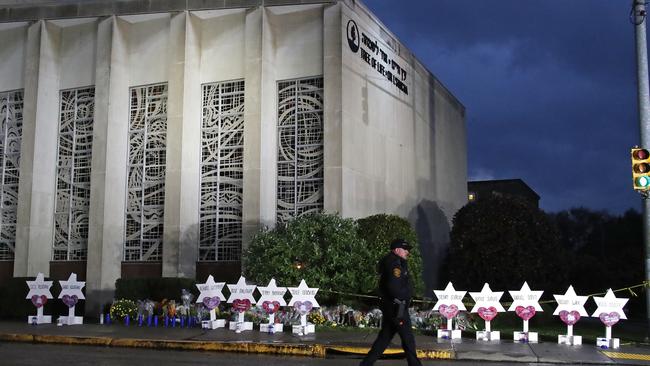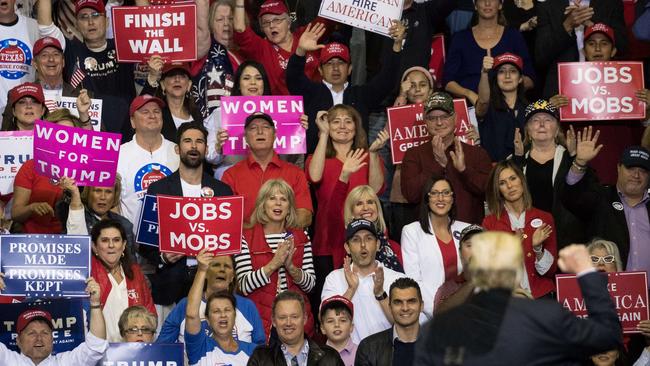Attacks have only divided Americans still further

During Mass at a Washington parish on Sunday, a priest asked plaintively during his sermon: “What has happened to the world?”
The question was a reaction to the weekend’s synagogue shooting in Pittsburgh, as well as the particularly senseless killing of a young man who helped feed the poor in Washington. But it also could have described the new backdrop for the midterm election in just one week.
The country now has experienced not one but three October surprises in the election stretch run: the Pittsburgh shooting, the mailing of pipe bombs to Democratic and news-media critics of President Trump, and the emergence of a caravan of Central American refugees trying to make it to the US border.
One can imagine a scenario in which, in particular, a deadly ambush at a synagogue and the dispersal of pipe bombs around the country might reduce the political divides in America, and soften the mood music in the political debate. Yet in fact, there are limited signs of that.
“I’m not so sure the national mood is any different today than it was a few weeks ago, actually,” says Kevin Madden, a top official in Mitt Romney’s 2012 Republican presidential run. “It was charged then, it’s charged now. The events of the last few days haven’t altered the mood as much as they’ve kept partisans dug in to their respective foxholes in the culture wars.”
That reality was perhaps best illustrated at a weekend rally in Illinois when Mr Trump told the crowd of supporters that he might tone down his rhetoric a bit — and the crowd shouted back, “No!”

In fact, the jarring events of recent days have put into stark relief the debates about Mr Trump that have been roiling all along: whether he is simply using immigrant-bashing as a political tool; whether his harsh verbal attacks labelling his foes and the press as enemies of the people incite actual violence against them; and whether his use of some of the same rhetorical flourishes as white nationalists encourages fringe haters such as the Pittsburgh shooter.
The responses from the White House and other parts of Trump world also fit what has become a familiar pattern: The shooting of Republican Representative Steve Scalise last year — like the bullet holes found Monday at a Florida GOP office — shows that the national mood isn’t the creation of Mr Trump. Moreover, Trump supporters point to social-media statements by the Pittsburgh shooter that Mr Trump is a “globalist” surrounded by Jews who is part of the problem as a sign that he wasn’t inspired by the president, and to pictures of a caravan of uninvited immigrants heading north as proof that the president is pointing to immigration reality rather than a concocted threat.
In crass political terms, the obvious question is whether or how all this might affect voting in next week’s midterm elections, understanding that the impact is blunted by the fact that many votes already have been cast by early balloting.
A good guess is that the caravan of Central American immigrants helps Republicans by reinforcing their message about illegal immigration and border security. Various anonymous comments by Republican consultants, almost gleeful in tone, underscore that guess.
Meantime, the pipe bombs and synagogue shooting are more likely to help Democrats by raising fear and anger over the president’s rhetoric, further energising Trump foes. The president’s own tweet last week bemoaning how the bombs would slow GOP momentum underscores that guess.
For the country, though, the broader and more important question is whether some leader might emerge from this fog to begin reversing the seemingly intractable angry national mood.
Mr Trump over the weekend swung between messages of unity and renewed attacks on his foes. In truth, the president isn’t a unifying figure. He didn’t rise in the political world by being one, and that’s not what his supporters expect of him. To some extent, they expect the opposite. They want him to sharpen differences, and express them in stark terms. That is what he does, and likely will continue to do.
Once this year’s election is over, Democrats will face their own choice about what kind of leader to nominate for the 2020 presidential race, one with a unifying message or one who sharpens the contrast with Trump partisans.
Interestingly, there is one Democrat already running for president who has staked his entire campaign on the proposition that people want a unifying figure. And almost no one knows who he is.
He’s Maryland Rep. John Delaney, a centrist who has been working the vineyards of Iowa and New Hampshire with a pledge to bring together a divided nation. He’s even produced a campaign book titled “The Right Answer: How We Can Unify Our Divided Nation.” In it, he writes, “We’ve got to stop retreating to our corners and complaining about each other.”
Is anybody listening? We’ll find out soon enough.
The Wall St Journal


